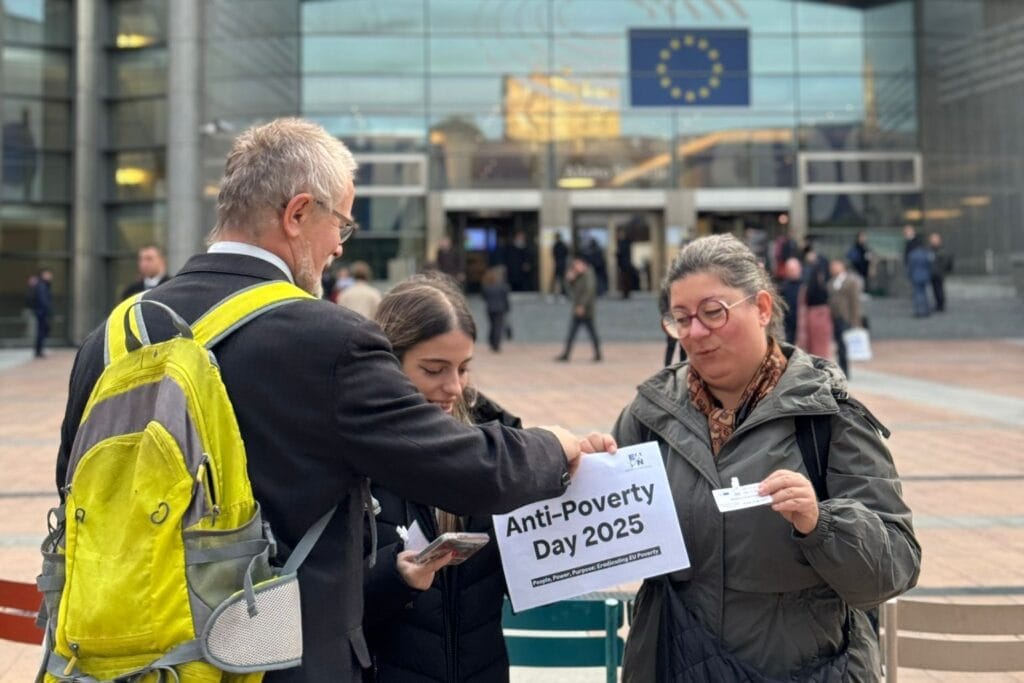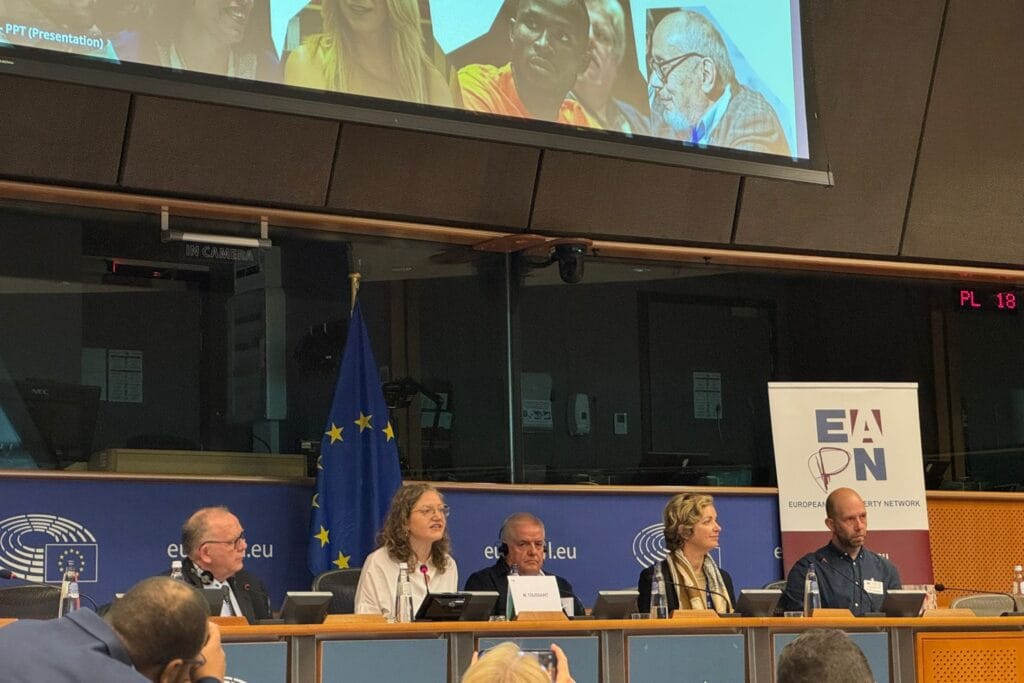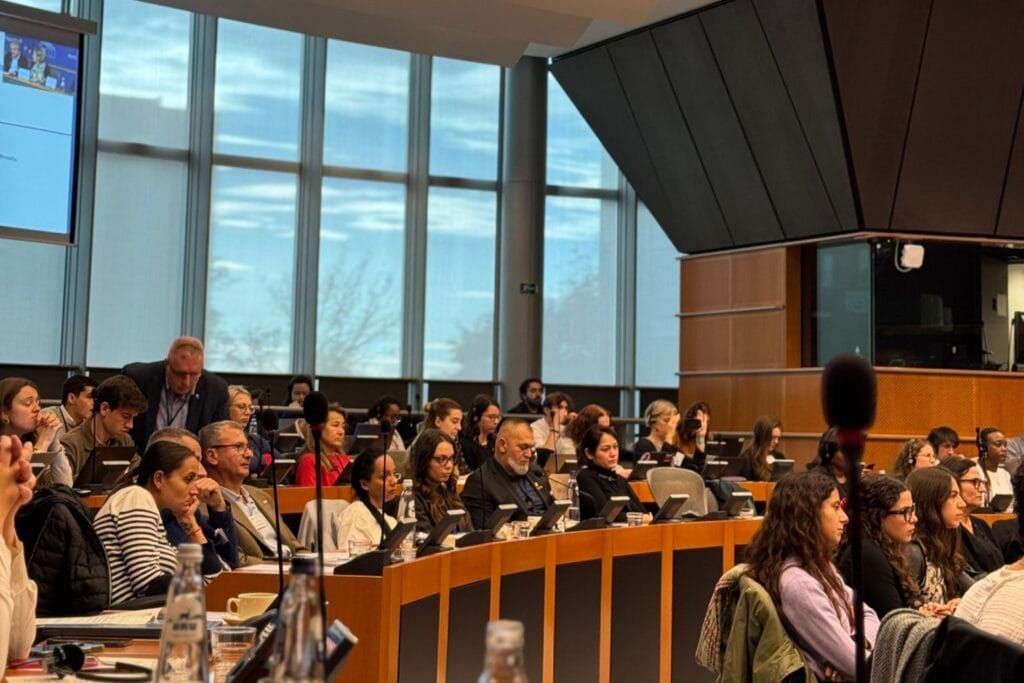
On 5 November 2025, we gathered at the European Parliament for a full day dedicated to one of Europe’s most pressing issues: poverty. Anti-Poverty Day brought together people experiencing poverty, civil society organisations, EU institutions, and Member States for a conversation absolutely necessary when over 21% of the EU population live in poverty.
This event was co-organised by EAPN with MEPs from Greens/EFA, S&D, The Left, Renew, and EPP, with the support of the Intergroup on Fighting Against Poverty.
Poverty Is a Democratic Issue
One thing became clear throughout the day: the fight for the eradication of poverty is also a fight for democracy.
Not only does poverty threaten democratic participation and people’s rights, but the solutions to end it rely on strong, meaningful participation at all levels of governance. For years, we have worked for this. But this time, we moved from talking about participation to reflecting on how it needs to happen for it to be real, representative, and fair.
For many of us, this was a small but important victory. We didn’t just discuss participation and democracy, we saw them at work.
About the Upcoming EU Anti-Poverty Strategy
After months of working closely with the European Commission, we received new insights about the upcoming EU Anti-Poverty Strategy. We learned that it will:
- reflect the multidimensionality of poverty
- take a preventive approach
- address the discriminatory aspects of poverty
- include a strong commitment to fight child poverty
- ensure participation at every stage of its development and implementation
Perhaps most importantly, we were told that the recommendations coming from hundreds of people across Europe, through EAPN and beyond, are being taken seriously. We hope this marks the beginning of a process rooted in compromise, accountability, and long-term commitment.
Looking at National & Local Realities
Anti-Poverty Day also highlighted that no single level of governance can tackle poverty alone. Poverty needs coordinated solutions at national, local and EU levels.
Throughout the day, we showcased best practices collected from 18 countries. These examples will form the basis of a report we will release next year to map what is working and where the biggest challenges remain.

The Issues We Can’t Ignore
The day also brought forward issues that people experiencing poverty face daily:
- bureaucracy acting as a poverty trap
- how discrimination and poverty feed into each other
- how the current narrative around poverty often reinforces harm
- the need to return to a systemic and structural understanding of poverty
We also discussed the realities faced by candidate countries, where poverty levels remain high and support is needed to reach shared goals. If the EU is serious about eradicating poverty by 2050, the Strategy will need to take these contexts into account.
A Reminder: Poverty Is Not an Accident
We closed the day with a strong reminder: anti-poverty strategies must be guided by human rights. Because poverty is not an earthquake or a natural disaster, it is structural, and it is political.
At EAPN, we are beginning a new series of internal exchanges called The Economy of Poverty. These discussions will explore how poverty functions within our current economic system and how the evolution of the welfare state has impacted both poverty and the fight against it. While EU priorities continue to centre competitiveness and militarisation, we will continue reminding institutions that eradicating poverty requires adequate funding, and real political will.

Thank You
This day was only possible thanks to a large number of people and organisations a sign of just how broad the movement against poverty must be.
A warm thank you to the MEPs who made Anti-Poverty Day possible:
Marie Toussaint, Hristo Petrov, Marit Maij, Pasquale Tridico, Anthony Smith, Leila Chaibi, Kinga Kollar, and Tilly Metz.
Thank you also to the strong representation from the European Commission, including the team preparing the EU Anti-Poverty Strategy and the Cabinet of Executive Vice-President Roxana Mînzatu, and to the European Economic and Social Committee.
We were honoured to hear from María Calle Garcia of the Spanish Ministry of Inclusion, Olivier De Schutter, the UN Rapporteur on Extreme Poverty, and the organisations who led insightful workshops and contributed to the panels.
Above all, we thank the people experiencing poverty, including a child, who shared their experiences and expertise. Their contributions grounded the discussion in reality and reminded us what is truly at stake.
A special thanks as well to the staff of the European Parliament, the Intergroup on Fighting Against Poverty, the Intergroup Coordinator Dafina Savic, the EAPN team, EAPN members across Europe and all of the speakers.
The list is long and that’s a good thing. Because eradicating poverty requires all of us.
